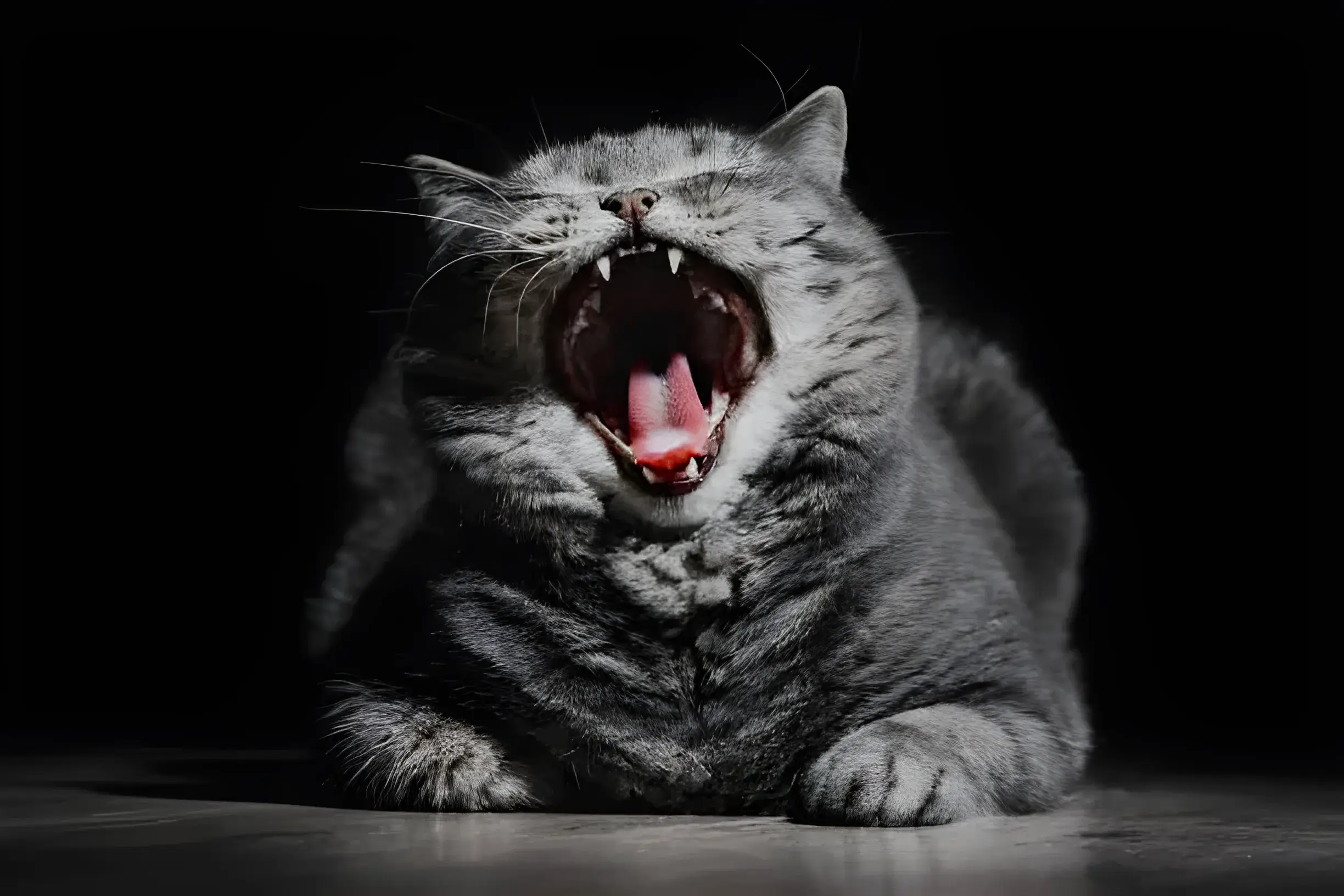Tired of your cat’s nighttime serenades? Let’s figure out why your cat is meowing at night and find solutions to help both of you get a good night’s rest.
Understanding Your Cat’s Meows
Cats make noise to communicate, so the first step is decoding what your cat is trying to say. Here are common reasons cats meow all night:
Boredom and Loneliness: Cats are social and playful. If they’re understimulated during the day, they might try to engage you at night.
Hunger or Thirst: Ensure your cat has food and water available overnight.
Health Concerns: Meowing can signal pain or discomfort. A vet checkup is crucial to rule out any medical issues.
Attention-Seeking: Sometimes cats just want a cuddle or some playtime, even if it’s in the wee hours.
Cognitive Decline: Older cats may meow due to confusion or disorientation, common as their senses decline with age.
Strategies for a Peaceful Night’s Sleep

Once you have a good idea of what might be causing your cat’s nighttime serenades, let’s explore these solutions:
The Power of Play: Before bed, engage your cat in energetic, stimulating playtime. Mimic predatory behaviors with toys like feather wands, crinkly toys, or even something as simple as a crumpled-up piece of paper. This helps them burn off excess energy.
Nighttime Entertainment: Set up a variety of toys your cat can enjoy independently after you’re asleep. Puzzle toys with hidden treats, self-rolling balls, or even a simple cardboard box can keep a playful cat entertained if they wake up mid-slumber.
Satisfy Hunger Cravings: If your cat seems food-motivated, consider an automatic feeder that offers small portions overnight. Alternatively, a substantial meal right before your bedtime might keep their tummy happy.
A Clean Place to Rest: Maintain a clean litter box! Cats are sensitive about their bathroom setup, and a dirty litter box can be a reason for protest vocalizations.
Vet Visit for Peace of Mind: If your cat’s meowing is a new behavior or seems excessive, visit your vet to ensure there’s no underlying medical reason that needs attention.
To Cuddle or Ignore: If your cat seems lonely, provide a comfortable sleeping spot near you with a familiar scent (like an old sweatshirt). However, if the meowing seems like attention-seeking, ignoring it consistently is the best (though sometimes initially difficult) route to reinforcing that it’s time to sleep.
Creating a Relaxing Space: For anxious cats, calming pheromone sprays or diffusers (such as Feliway) can reduce overall stress levels. Nightlights in frequently visited areas are beneficial for older cats whose eyesight might be diminishing.
Important Reminders
- Patience is Key: Finding the right solution might take trial and error.
- Don’t Punish: Never yell at or punish your cat for meowing. This only increases stress and won’t address the root of the problem.
My Cat Still Won’t Stop Meowing! – Troubleshooting Tips
Consistency is King: Consistency is King: It can take weeks for a cat’s behavior to change. Don’t give up! Giving in and offering attention, even once, can reset your progress. Remember, even when your cat is still meowing, consistent use of these solutions acts as prevention – it makes the habit harder to reinforce and easier to break over time.
Become a Cat Meows Detective: Keep a “sleep diary” for a few nights. Track the timing of your cat’s meows, their intensity, and your responses. Identifying patterns can offer valuable clues about the cause. For example, frequent meows right after you turn off the lights might indicate your cat wants playtime, while pre-dawn meows could signal hunger pangs.
Consider Environmental Triggers: Could something outside be stimulating your cat? Maybe it’s stray cats yowling at night, or loud noises like traffic or construction. Address these issues with blackout curtains, white noise machines, or moving your cat’s bed to a quieter location.
Preemptive Measures for Kittens

Setting Your Kitten Up for Sleep Success:
Daytime Play is Key: Schedule regular, interactive playtime sessions throughout the day to tire out your kitten before bedtime. This expels their energy and reduces the urge to prowl at night.
Nighttime Routine: Establish a consistent bedtime routine. Dim the lights, offer quiet playtime, and then place your kitten in their designated sleep space.
Cozy Sleep Haven: Create a comfortable and safe sleep space for your kitten. Use a soft bed, place it in a quiet part of the house, and consider using a heating pad (on low) for extra comfort, especially in colder months.
Kitten Companionship: If possible, consider adopting two kittens together. Kittens provide companionship for each other, reducing nighttime boredom and loneliness that can lead to meowing.
When to Seek Professional Help
While most nighttime meowing can be addressed at home, there are times when professional help might be necessary. Here are some signs that suggest a deeper issue:
Changes in Vocalization: Does your cat’s meow sound different? Is it hoarse, raspy, or accompanied by yowling? These could indicate a medical issue.
Unexplained Behavior Changes: Is the excessive meowing combined with other changes, such as hiding, loss of appetite, or aggression? These could signal underlying stress or health problems.
No Response to Strategies: If you’ve tried the home remedies diligently, but your cat’s meowing shows no improvement or worsens, it’s time to consult an expert.
How a Cat Behaviorist Can Help: A certified cat behaviorist can assess your cat’s environment, identify stress triggers, and create a personalized behavior modification plan. They may also collaborate with your vet to ensure there is no underlying medical component.
Real-Life Success Stories
The Lonely Kitten Who Found Her Voice: “My kitten meowed all night long after we brought her home. I was worried, but it turned out she was simply lonely. Adding a second kitten as a playmate solved the problem, and now they both sleep peacefully!” – Evelyn. L
The Senior Cat’s Nighttime Confusion: “My older cat’s meowing got worse at night. The vet diagnosed early cognitive decline. Nightlights and a comforting routine have made a huge difference.” – Ben M.
Conclusion
By figuring out the reason behind your cat’s nighttime meowing, you can take steps to make both your lives happier and more sleep-filled. Implementing the right strategies for your cat’s unique needs leads to a calmer household and finally allows everyone to enjoy uninterrupted nights.
The photo featured below the post headline is Credit: Aleksandr Luzhbin/istockphoto
I hope you find this post helpful and informative. If Yes’ feel free to share it with your friends!
Frequently Asked Question
My cat is old and meowing seems new. What should I do?
Discuss this with your vet immediately. Older cats can experience health problems or cognitive decline that make them meow at night.
My cat wants attention all night. How can I break the habit?
It’s tough, but ignoring the meows is crucial. Responding reinforces the behavior. Consider providing more enrichment during the day and a cozy sleep space to reduce nighttime loneliness.
Is there anything else I can try?
Consider speaking to a cat behaviorist for complex cases. They can offer personalized advice.
My cat suddenly started meowing at night after we moved. Is this normal?
Yes, moving can be stressful for cats. Help them adjust with familiar scents (provide old blankets), maintain their routine as much as possible, and offer extra cuddles and play to combat anxiety.
Does spaying or neutering help with nighttime meowing?
It can! Spaying/neutering reduce hormone-driven behaviors, like attention-seeking yowls for a mate. It’s particularly helpful for cats who aren’t yet fixed.
My cat sleeps all day and meows all night. How can I change this?
Break up long daytime naps with several short, engaging play sessions. These bursts of activity mimic their natural hunting instincts and help them be more tired at night. Also, avoid leaving your cat alone for excessively long periods during the day, as this can lead to boredom-fueled meowing at night.
Can I leave a light on for my cat at night to stop the meowing?
It might help, especially for older cats struggling with vision issues in low light. Experiment with dim nightlights in places your cat frequents at night to see if this reduces confusion-based meowing.
My cat starts meowing at 4 AM for food. How can I stop this?
Switch to an automatic feeder that dispenses a small portion of food in the early morning. This satisfies your cat’s hunger and breaks the association between you and the feeding routine.
Can calming products like Feliway help my cat meow less at night?
Yes, they may help! These products mimic natural cat pheromones, reducing anxiety that can contribute to excessive meowing.
My cat yowls at night and seems restless. Should I worry?
If the yowls are unusually loud or accompanied by changes in behavior (hiding, aggression), consult your vet as this could indicate pain or health issues.
How long does it take to stop a cat from meowing at night?
There’s no one-size-fits-all answer, as it depends on the cause of the meowing and how consistently you implement solutions. Be prepared to experiment and stay patient, often some improvement can be seen within a few weeks.

